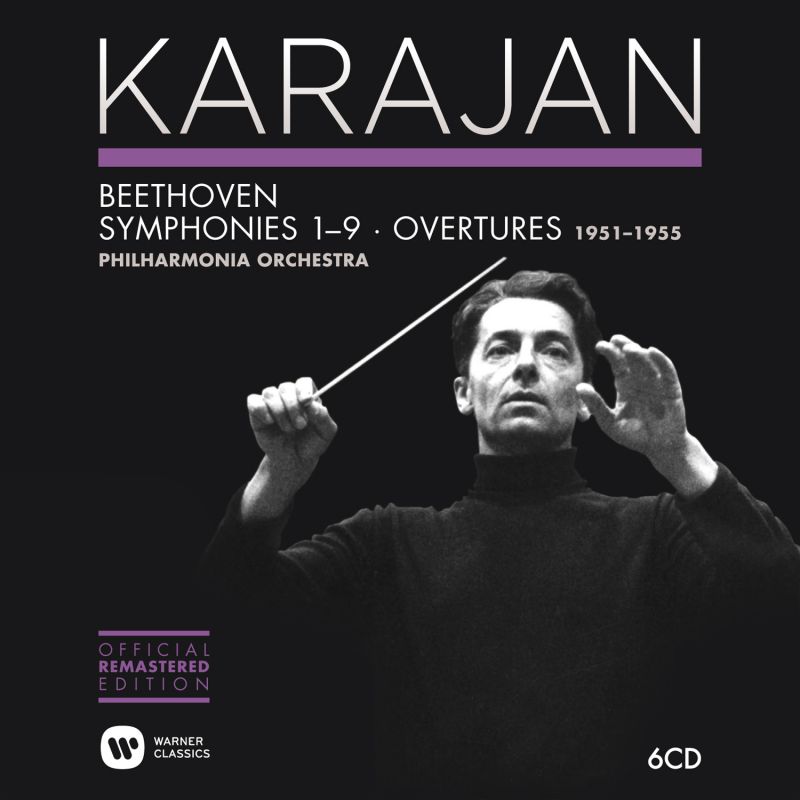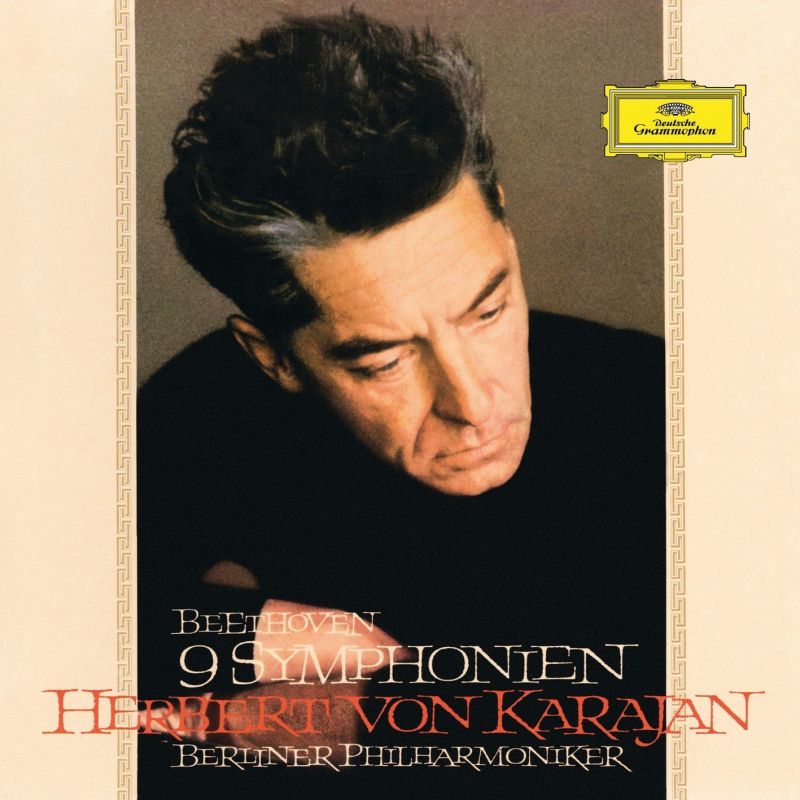Beethoven: Complete Symphonies
View record and artist detailsRecord and Artist Details
Composer or Director: Ludwig van Beethoven
Label: Karajan Memorial
Magazine Review Date: 1/1990
Media Format: CD or Download
Media Runtime: 354
Mastering:
ADD
Catalogue Number: 763310-2

Tracks:
| Composition | Artist Credit |
|---|---|
| Symphony No. 1 |
Ludwig van Beethoven, Composer
Herbert von Karajan, Conductor Ludwig van Beethoven, Composer Philharmonia Orchestra |
| Symphony No. 2 |
Ludwig van Beethoven, Composer
Herbert von Karajan, Conductor Ludwig van Beethoven, Composer Philharmonia Orchestra |
| Symphony No. 3, 'Eroica' |
Ludwig van Beethoven, Composer
Herbert von Karajan, Conductor Ludwig van Beethoven, Composer Philharmonia Orchestra |
| Symphony No. 4 |
Ludwig van Beethoven, Composer
Herbert von Karajan, Conductor Ludwig van Beethoven, Composer Philharmonia Orchestra |
| Symphony No. 5 |
Ludwig van Beethoven, Composer
Herbert von Karajan, Conductor Ludwig van Beethoven, Composer Philharmonia Orchestra |
| Symphony No. 6, 'Pastoral' |
Ludwig van Beethoven, Composer
Herbert von Karajan, Conductor Ludwig van Beethoven, Composer Philharmonia Orchestra |
| Symphony No. 7 |
Ludwig van Beethoven, Composer
Herbert von Karajan, Conductor Ludwig van Beethoven, Composer Philharmonia Orchestra |
| Symphony No. 8 |
Ludwig van Beethoven, Composer
Herbert von Karajan, Conductor Ludwig van Beethoven, Composer Philharmonia Orchestra |
| Symphony No. 9, 'Choral' |
Ludwig van Beethoven, Composer
Elisabeth Höngen, Contralto (Female alto) Elisabeth Schwarzkopf, Soprano Ernst Haefliger, Tenor Herbert von Karajan, Conductor Ludwig van Beethoven, Composer Otto Edelmann, Bass Philharmonia Orchestra Vienna Singverein |
| Coriolan |
Ludwig van Beethoven, Composer
Herbert von Karajan, Conductor Ludwig van Beethoven, Composer Philharmonia Orchestra |
| Egmont, Movement: Overture |
Ludwig van Beethoven, Composer
Herbert von Karajan, Conductor Ludwig van Beethoven, Composer Philharmonia Orchestra |
Composer or Director: Ludwig van Beethoven
Label: DG
Magazine Review Date: 1/1990
Media Format: CD or Download
Media Runtime: 332
Mastering:
ADD
Catalogue Number: 429 036-2GX5

Tracks:
| Composition | Artist Credit |
|---|---|
| Symphony No. 1 |
Ludwig van Beethoven, Composer
Berlin Philharmonic Orchestra Herbert von Karajan, Conductor Ludwig van Beethoven, Composer |
| Symphony No. 2 |
Ludwig van Beethoven, Composer
Berlin Philharmonic Orchestra Herbert von Karajan, Conductor Ludwig van Beethoven, Composer |
| Symphony No. 3, 'Eroica' |
Ludwig van Beethoven, Composer
Berlin Philharmonic Orchestra Herbert von Karajan, Conductor Ludwig van Beethoven, Composer |
| Symphony No. 4 |
Ludwig van Beethoven, Composer
Berlin Philharmonic Orchestra Herbert von Karajan, Conductor Ludwig van Beethoven, Composer |
| Symphony No. 5 |
Ludwig van Beethoven, Composer
Berlin Philharmonic Orchestra Herbert von Karajan, Conductor Ludwig van Beethoven, Composer |
| Symphony No. 6, 'Pastoral' |
Ludwig van Beethoven, Composer
Berlin Philharmonic Orchestra Herbert von Karajan, Conductor Ludwig van Beethoven, Composer |
| Symphony No. 7 |
Ludwig van Beethoven, Composer
Berlin Philharmonic Orchestra Herbert von Karajan, Conductor Ludwig van Beethoven, Composer |
| Symphony No. 8 |
Ludwig van Beethoven, Composer
Berlin Philharmonic Orchestra Herbert von Karajan, Conductor Ludwig van Beethoven, Composer |
| Symphony No. 9, 'Choral' |
Ludwig van Beethoven, Composer
Berlin Philharmonic Orchestra Gundula Janowitz, Soprano Herbert von Karajan, Conductor Hilde Rössl-Majdan, Mezzo soprano Ludwig van Beethoven, Composer Vienna Singverein Waldemar Kmentt, Tenor Walter Berry, Bass-baritone |
Author:
The names Philharmonia, Karajan and Legge made this an historic recording enterprise, but to these personalities must be added the fact that the LP record was then fairly new, stereo was just happening and, as Karl Schumann's accompanying note reminds us, Karajan's Beethoven, energetic, strongly rhythmical and deeply concerned with beauty of sound, was the antithesis of Furtwangler's, who died while this cycle was still incomplete. Of course, Toscanini had already instituted a highly precise, and some would say soulless, interpretative approach to Beethoven. The young Karajan was an admirer of Toscanini. He learnt from him that Beethoven's titanic strength could emerge equally well from performances that were accurate and objective but being an Austrian he shunned Toscanini's rigidity and ferocity.
These Philharmonia performances represent Karajan's first attempt to formulate his own Beethoven style—it was to be a lifetime's search. They are still magnificent—brimming with youthful vitality but full, too, of those characteristic shafts of light turned on to Beethoven's scoring, as for example in the joyful account of the Pastoral Symphony in which the finale, taken slower than in the first Berlin cycle of 1962, achieves an extraordinary spirituality. In No. 4, too, the playing of the Philharmonia strings in the Adagio and of the prindpal clarinet in the same movement is a reminder of the standard to which Karajan had so quickly raised this new orchestra.
The performances of Nos. 3, 5 and 7 all have outstanding virtues. If one stresses the rhythmic vitality, especially in the finale of No. 7, and the fast tempos which came as something of a shock at the time but now seem merely to have anticipated by 30 years what we take on the chin from the 'authentic' school of conductors, that should not detract from our pleasure in Karajan's lyrical and flowing treatment of the slow movements. As for the recording quality, it is quite remarkable, with a range and balance that are enhanced by CD.
If one wishes to make a spot-check on how Karajan's Beethoven developed, or changed, in a decade, the Allegretto of No. 7 provides a classic example. The pulse of the music is quicker than in the Philharmonia performance the legato smoother, the tone-colour more sharply defined. There is no doubt, in my opinion, that this 1962 Berlin Philharmonic cycle is one of the greatest Beethoven series ever committed to disc, both as orchestral performance and conductor's interpretation, and also as recording. Although there are sublime individual passages in the 1982–5 cycle, it is not as consistently fine as the 1962 (and this earlier cycle had the advantage of being recorded in the Jesus-Christus Kirche).
Nor can one evade the fact that, fine as the Philharmonia of the 1950s was, the Berlin Philharmonic of 1962 was its superior in every department. The refinements of its playing are too numerous to set out in detail, but how anyone could listen to these performances and then say that Karajan was 'bland' is beyond my comprehension. The brass playing throughout, and particularly in the Eroica funeral march, is just wonderful. The pizzicato at the start of the Eroica finale has to be heard to be believed—precise, yes but how meaningful too. The playing of No. 4, too, has all the grace and beauty of the Philharmonia performance, and then some.
The crown of both cycles is the Ninth, with the quartet of soloists carefully chosen each time and the same choir in both. (My preference is for the 1955 quartet, mainly because the male singers are better.) But the Berlin performance has a certainty that comes to a conductor only rarely, and did not come again to Karajan in the 1980s (listed above). Both boxes are well presented. The DG set has a long and perceptive article by RO which is required reading. The EMI set also contains performances of the Coriolan and Egmont overtures.'
Discover the world's largest classical music catalogue with Presto Music.

Gramophone Digital Club
- Digital Edition
- Digital Archive
- Reviews Database
- Full website access
From £8.75 / month
Subscribe
Gramophone Full Club
- Print Edition
- Digital Edition
- Digital Archive
- Reviews Database
- Full website access
From £11.00 / month
Subscribe
If you are a library, university or other organisation that would be interested in an institutional subscription to Gramophone please click here for further information.




